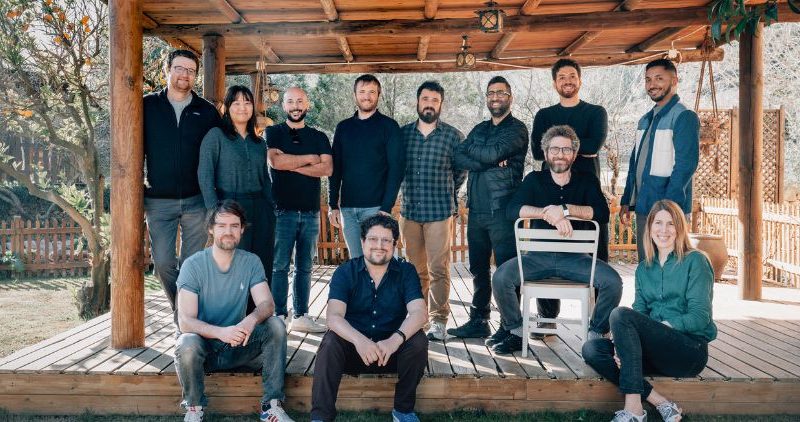Lunar Ventures launches €50M Fund II to fuel post-AI deeptech founders across Europe and the US

The deep tech sector has surged in popularity, generating substantial returns and attracting numerous European VC firms. By 2023, deep techrepresented44% of all tech investments in Europe — an 18% increase since 2019. This impressive growth has positioned deep tech ahead of traditional sectors like fintech and SaaS, making it the driving force behind Europe’s next wave of global tech champions.
Despite increased venture capital interest, the sector faces a shortage of specialised expertise and proven experience. Deep tech startups require 35% more time and 48% more capital than traditional startups to reach $5 million in revenue, making specialist support and patient capital essential. Lunar Ventures addresses this challenge with its highly skilled team and substantial deep tech investment experience.
Berlin-based Lunar Ventures is launching Fund II for pre-seed deeptech investments, building on its success in identifying emerging themes like LLMs (large language models), Homomorphic Encryption, and Decentralised Science before mainstream adoption. The firm’s early conviction has been validated through market adoption and follow-on investment from top-tier global VCs.
Fund II has attracted backing from leading institutions —Isomer Capital, Exor’s Lingotto, the Intesa San Paolo Endowment, and the Grinnell College Endowment. A cohort of tech founders and GPs from top European funds has also joined, demonstrating confidence in Lunar’s approach and the sector’s potential.
Founded in Berlin byDr. Elad Verbin,Mick Halsband, andLuis Shemtov, Lunar Ventures has grown to 11 experts. The expanded team reflects the firm’s commitment to diverse expertise, including PhDs in computer science and physics, former CTOs, and operators experienced in scaling deep tech companies from inception to exit.
Europe’s deep tech ecosystem is flourishing. The European Innovation Council (EIC) will invest €1.4 billion in deep tech and high-potential startups in 2025, up €200 million from 2024. The EIC Fund has invested over €1.2 billion in more than 100 deep tech companies, fostering over 150 ‘centaurs’ (valued at € 100 M+) and eight unicorns since 2021. Key European hubs — London, Paris, Munich, and Stockholm — have collectively attracted over $30 billion in deep tech funding since 2018.
Mick Halsband, Founder and General Partner at Lunar Ventures, says: “We set out to build a different kind of firm: a complementary team of engineers, operators, and PhDs dedicated to being the earliest and most technical partner to deeptech founders. At Lunar, we back technical builders from day zero, before traction or hype, with the in-house expertise to build conviction before consensus.
“In the past decade, capital flows into deeptech grew tenfold to $15B, yet founders still prioritise mission-aligned partners who understand the science behind the hype, and are in it for the long haul. Since 2019, Lunar has been an early believer in LLMs, homomorphic encryption, decentralised science, local-first infra, and more – all since discovered by the market. We are eager to meet the founders shaping what comes next.”
Lunar Ventures Fund I closed in 2021, exceeding its initial €20M target to close 2x oversubscribed at €40M. By August 2023, Fund I had invested in 25 companies. Six portfolio companies — Deepset, Zama, Molecule, Hathora, Electric, and Unify — attracted subsequent investment from tier-1 US VCs, including Upfront Ventures, Spark Capital,Google Ventures, SignalFire, andFounders Fund. This success demonstrates Lunar’s ability to identify and nurture globally relevant deep tech companies from their earliest stages.
Fund II will focus on three key areas beyond current AI: companies gathering rare, high-quality data at scale; tools accelerating scientific discovery at the intersection of biology and computation; and infrastructure enabling intelligent systems to function reliably in unpredictable environments. As proven first-movers, Lunar’s focus indicates emerging themes likely to dominate the future and AI’s secondary implications.
Fund II has already begun investing, leading pre-seed rounds in Bruin and Lodestar. Berlin-based Bruin unifies data quality, observability, governance, and transformation in one platform, enabling teams to focus on driving business forward rather than managing infrastructure.
London-based Lodestar Space develops autonomous, mission-ready robotic systems to protect critical space infrastructure from in-orbit threats. The team has secured backing from the UK and European Space Agencies to advance sovereign EU space robotics.Neil Buchanan, CEO and Co-Founder of Lodestar Space, says: “Lunar had the technical depth to understand what we were building and the conviction to back us before anyone. They brought clarity, conviction, and hands-on support when it mattered most.”
The Fund II portfolio has achieved two up-rounds, with eight investments spanning multi-engine data processing, AI drug discovery for covalent medicines, and compliant agentic AI for regulated environments. Lunar plans to deploy Fund II across 25-30 companies, investing €750K-1M at the earliest possible stage. About 20% will support underserved US-based companies outside the Bay Area.
Lunar’s technical expertise and pre-seed focus address a crucial gap in the European ecosystem. While many VCs have entered deep tech, few provide the hands-on, science-driven support for long development cycles and complex technical challenges. This becomes increasingly important as nearly half of Europe’s late-stage deep tech VC funding now comes from non-European investors, making early-stage specialisation and local support vital.

Published on Other News Site
















